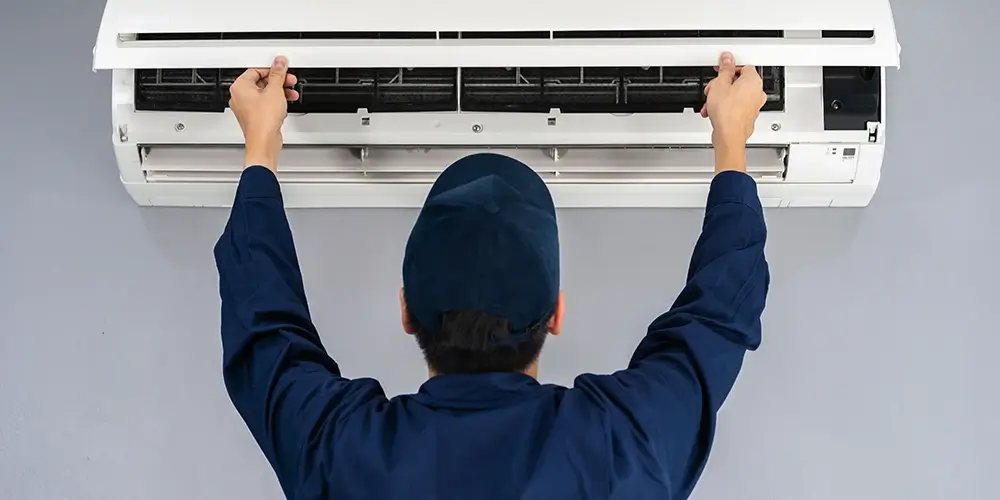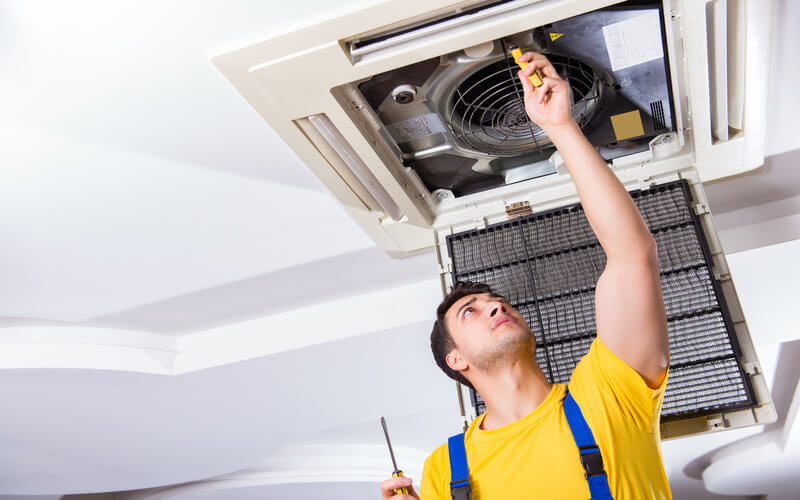Air Conditioning Repair Near Me for Beginners
Air Conditioning Repair Near Me for Beginners
Blog Article
Some Known Details About Ac Fixing
AC Fixing: Specialist Cooling System Restoration Guarantees Your Home Stays Comfy Throughout The Year
Types of A/c Systems
When dealing with a/c repair work, understanding the type of a/c system you're handling can save time, money, and stress. Ever wondered why some systems cool a space faster than others? Or why specific systems seem to break down more regularly? Let's peel back the layers.
Central Air Conditioning
The Ultimate Guide To Ac Fixing
Think of a cool breeze flowing through an entire home, whispering convenience into every corner. Central air conditioning systems do precisely that. They use a network of ducts to distribute cooled air, relying on a compressor and condenser outside, coupled with an evaporator coil inside. When this complex monster fails, pinpointing the problem can be like discovering a needle in a haystack.
Split Systems

Split systems are a popular choice for numerous homes-- part indoor unit, part outside compressor. They use versatility and effectiveness, however their dual nature means repair can include either component. Have you ever heard an odd sound outside your home just to discover the indoor system isn't cooling? That's a timeless sign of a split system glitch.
All about Fix Air Conditioner
Window Units
These compact warriors battle summer season heat by fitting snugly into a window frame. They combine all components into a single box. Their simpleness typically means less repair headaches, but ignoring filters or allowing debris buildup can result in reduced performance or breakdowns.
Ductless Mini-Splits
The Buzz on Ac Fixing
Ductless systems bypass ductwork totally, making them ideal for homes without existing ventilation. They're peaceful, effective, and surprisingly resistant. Yet, when repairs are needed, specialists must be proficient at managing refrigerant lines and electrical connections-- no little accomplishment.
Quick Recommendation Table
| Type | Key Features | Common Repair Work Issues |
|---|---|---|
| Central air conditioning | Ductwork, whole-house cooling | Duct leaks, compressor failure |
| Split System | Indoor & & outdoor units | Refrigerant leaks, fan motor issues |
| Window Unit | All-in-one, easy installation | Unclean filters, electrical faults |
| Ductless Mini-Split | No ducts, zoned cooling | Line leaks, sensor breakdowns |
The 10-Minute Rule for Ac Fixing
Deciphering the Many Regular A/c Problems
Have you ever wondered why your a/c unexpectedly stops cooling throughout a sweltering afternoon? One common culprit is an unclean or stopped up air filter. This sly bad guy restricts airflow, forcing your system to work overtime, which not just decreases efficiency but can also cause early breakdowns. Envision trying to breathe through a headscarf taken in dust-- it's tiring!
Another regular hiccup is refrigerant leakages. These undetectable leaks do not just decrease cooling power however can also harm the compressor, the heart of your air conditioner system. How typically do you look for uncommon hissing noises or ice formation on the coils? Capturing these signs early can conserve you from pricey repairs down the line.
Beyond the Essentials: Lesser-Known Issues
Not known Details About Repair Air Conditioner Near Me
Often, the thermostat itself is the nuisance. Miscalibrated or faulty thermostats send mixed signals, triggering the AC to cycle unpredictably. Ever skilled your a/c turning on and off in quick succession? That's called brief biking, a tricky efficiency drainer that can wear parts quicker than you 'd anticipate.
Electrical problems, such as used circuitry or a malfunctioning capacitor, might lurk underneath the surface. Repair Air Conditioner Near Me. These frequently manifest as AC units stopping working to begin or unexpectedly shutting down. A professional eye knows to test these components with accuracy tools, something a casual glance won't expose
Expert Tips for Diagnosing Common Air Conditioning Concerns
Not known Incorrect Statements About Ac Air Conditioner Repair
- Inspect and replace air filters regularly-- every 1 to 3 months depending on usage and environment.
- Listen for unusual noises like rattling or buzzing that might signify loose parts or electrical faults.
- Examine the outside system for debris or obstructions that impede airflow and cause overheating.
- Search for frost buildup on evaporator coils, a hint towards refrigerant problems or air flow restrictions.
- Evaluate the thermostat settings and recalibrate if the temperature level readings feel off.
Quick Referral Table: Symptoms & & Probable Triggers

| Sign | Probable Cause | Expert Pointer |
|---|---|---|
| Warm air blowing | Low refrigerant or filthy coils | Tidy coils and look for leaks right away |
| Brief biking | Thermostat problems or large system | Adjust thermostat settings and speak with sizing standards |
| Unit will not start | Electrical faults or capacitor failure | Test circuitry and change capacitors as needed |
| Water leak | Clogged drain line or frozen evaporator | Clear drain lines and inspect for coil icing |
DO IT YOURSELF A/c Upkeep Tips
About Air Conditioning Repair
Ever observed your a/c unit sputtering like an old engine on a hot summer season day? Neglecting subtle indications website frequently suggests more than simply a sweaty afternoon-- it's a start to unforeseen AC repair work costs. What if you could capture those whispers before they turn into wails? Routine do it yourself maintenance can be your first line of defense.
Basic Actions to Keep Your Air Conditioner Running Smoothly
Getting The Ac Air Conditioner Repair To Work
- Clean or Replace Filters: A clogged up filter is like attempting to breathe through a scarf. Every 1-3 months, check and switch out your filters. It improves air flow and efficiency, preventing compressor stress.
- Inspect the Condenser Coils: Dust and particles function as invisible blankets smothering your system's cooling power. Carefully brush or vacuum the coils, but avoid severe chemicals that may wear down the metal.
- Examine the Drain Line: When was the last time you looked at your drain pan? A blocked drain can trigger water leaks and foster mold development. Flushing it with a vinegar option regular monthly keeps the circulation clear.
- Seal and Insulate: Are your ductworks whispering leakages? Sealing spaces with mastic or foil tape boosts efficiency and cuts down on unequal cooling.
Pro Tips Beyond the Fundamentals
- Measure your unit's voltage to catch subtle electrical wear before it stimulates big issues.
- Listen for uncommon hums or rattles-- these acoustic breadcrumbs typically signal loose parts or failing motors.
- Keep outdoor units shaded but guarantee at least 2 feet of clearance around them for optimum airflow.
Ask yourself: Are you hearing your a/c's quiet SOS or simply awaiting it to scream? Requiring time for DIY a/c maintenance changes reactive repair work into proactive care, saving sweat, tension, and yes, money.
The smart Trick of Air Conditioning Repair That Nobody is Discussing
Why Competence in AC Repair Work Matters
Envision this: your air conditioning unit sputters and groans during a scorching afternoon, leaving you sweltering inside your home. Would you trust a newbie fumbling with fragile parts, or would you look for the peace of mind of a professional a/c professional!.?.!? The complexities of contemporary cooling systems demand precision and experience. A slight miscalculation can intensify a small malfunction into a pricey catastrophe.
All about Air Conditioning Repair
Hidden Intricacies Behind the Cool Breeze
Lots of undervalue the layers concealed underneath the sleek exterior of an air conditioner unit - AC Fixing. From refrigerant leakages that quietly drain efficiency to faulty thermostats that misread temperature levels, these issues need more than a basic toolkit. Professionals have a keen eye for identifying issues that average homeowners neglect
Necessary Tips for Selecting the Right Professional
10 Easy Facts About Air Conditioning Repair Shown
- Accreditation and Training: Validate qualifications; a service technician trained in the most recent HVAC innovations is important.
- Experience with Particular Systems: Not all AC units are produced equivalent; discover somebody knowledgeable about your design's quirks.
- Diagnostic Approach: Proficient professionals utilize sophisticated tools-- like electronic leakage detectors and thermal imaging-- to pinpoint surprise faults.
What to Anticipate from a Pro's Diagnostic Process
| Step | Purpose | Specialist Insight |
|---|---|---|
| Visual Inspection | Determine obvious wear or damage | Look for corrosion or unusual noises-- an indication typically disregarded |
| Pressure Evaluating | Spot refrigerant leakages | Subtle pressure drops can hint at micro leakages invisible to the naked eye |
| Electrical Testing | Guarantee circuit integrity | Loose connections can simulate extreme mechanical failures |
The Greatest Guide To Ac Repair
Why DIY Often Falls Short
Tempting as it is to play with your air conditioner unit, DIY repairs frequently miss the origin. Topping off refrigerant might briefly cool your area but overlooks leakages that get worse over time. Expert service technicians don't just patch signs; they hunt down the underlying mechanical and electrical faults that sap performance.
Air Conditioning Repair Fundamentals Explained
Concerns to Ask Before Employing
- What diagnostic tools do you use to recognize concerns?
- Can you describe the repair procedure and expected results?
- Are you familiar with the refrigerants suitable with my system?
- Do you follow security protocols for dealing with electrical components?